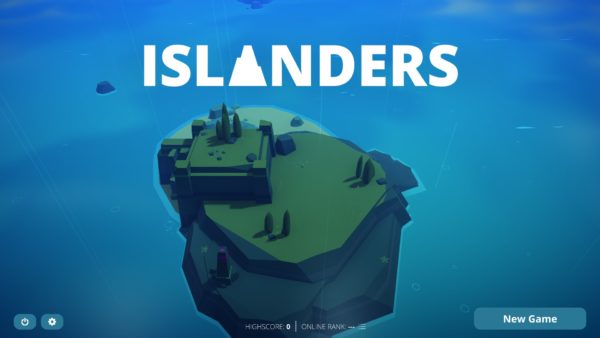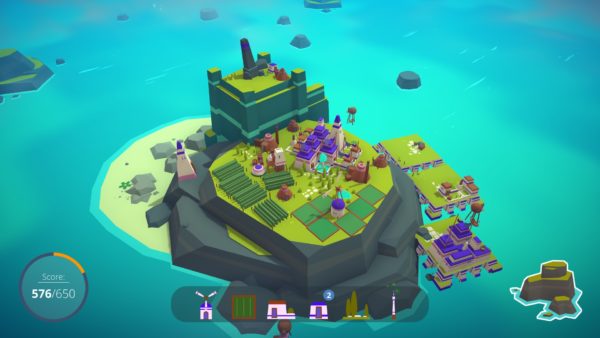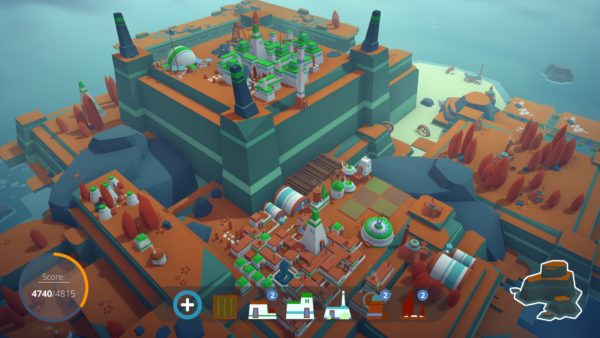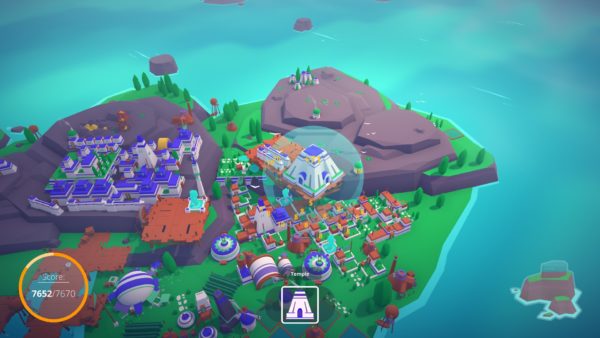It’s not often that a developer simply explaining the mechanics sells me on the game. Usually if you can’t simply show how it works through a gameplay trailer or similar I’ll switch off as even high concept games can hook you with as much. Still though I was intrigued by the voiced over trailer that GrizzlyGames put on their Steam page for Islanders, a rework of typical city builder/strategy games where there’s no resources to harvest, economies to manage or little NPCs trotting around. No instead everything is based around the buildings and how much you can make of them, something which sounds simple on first take but takes some real practice to get a feel for.

Graphically Islanders has a bright and simple aesthetic, taking inspiration from the numerous low-poly games that have made the style quite popular with the indie crowd. The simplicity is also partly born out of necessity as you’ll quickly start to crow out your little island in short order, making it a bit of a visual challenge as the game progresses. The highly saturated colours coupled with the varied biomes and procedural generation of each island means you’re not likely to get bored of the visuals any time soon. After spending my time in high end visuals from AAA developers it’s been nice to go back to a more visually simple game.
The core mechanic of Islanders is intriguing: instead of it following the usual city builder or RTS trope of giving you a main base and then letting you loose to harvest resources instead you’re given a handful of buildings. Each building you place will give you a certain number of points, something you can maximise if you understand what gives them bonuses. Just blindly plonking down buildings in places that give you the most points isn’t actually a bad strategy to start off with, however you quickly realise that if you want to go after the high score you’re going to have to be a lot more strategic about it. Each of the different island biomes has different mechanics available to it and you’ll need to understand each of them in order to maximise their effect. Further to that there’s numerous late game buildings that have synergies that you’ll need to build towards and that’s when the real challenge starts to set in.

You’ll likely want to set up various areas that are dedicated to a certain kind of synergy like say an area for houses, another for mansions and an area for all your farming/brewing/logging activities. This is because those buildings not only have synergies with themselves they also have strong disaffinity with each other’s late game buildings. This is something that became painfully obvious to me after I’d clustered as many buildings together in one spot only to realise that the late game buildings were effectively useless, preventing me from going on any further. Thankfully there is an out for this but you’ll want to use it strategically lest you abandon all the good work you’ve done and, by consequence, many of those delicious points.
The mechanic I’m referring to is the ability to travel to the next island. The game does confirm with you that you want to move on but it never goes into the why of it. If you’re like me you’ll likely just hit the next island button the second it becomes available, a viable strategy in some cases, however you’re likely better placed to hang onto it until you get yourself into a corner. You see Islanders will go on for as long as you have a building (or + sign, which allows you to get more buildings) in your inventory. If you find yourself in a position where you can’t get to the next lot of buildings and you’ve got a next island available you can continue afresh there. The game will then reset the target score to just 20 above your current, giving you free reign over the next island. Whilst this isn’t always an option understanding this is what helped me go from the 8,000th ranked player to around the 800th. I’m sure there’s even deeper strategies than that but honestly, I’m happy enough with that.

Islanders does have a good amount of polish on it although you can still pull off some shenanigans with building placement if you fiddle for long enough. The platforms seem to be the easiest ones to mess around with as I was able to embed a few water platforms in places where there was no water. You can do this by finding a place where it’ll let you place it and start sliding it against one of the invisible walls the game puts there to help you with placement. Done right you can slide along them for quite a ways, giving you a lot more options than would otherwise be available. I didn’t find any other issues during my playthrough so hats off to the developers for testing it thoroughly.
There are a couple improvements I’d like though. An undo button, even if it was just for the last thing you placed, would be nice as a small quality of life improvement. I can’t tell you how many times I placed a building awkwardly only realising I could’ve done it better if I moved the camera a little bit. It’d also be nice to have a mode that allowed you to rearrange things, possibly with a higher requirement on points for each level, as it’s quite satisfying to place a building just right and have all those little tokens tinkle away onto the score board. Thinking about it more most of the things I’d like to see in the game are just things that’d make me want to play it for longer, not so much things that need to be fixed.

Islanders is a fantastic twist on the typical city builder game, stripping away the mechanical complexity and replacing it instead with skill mastery. The visuals are simple and wonderfully colourful, a trend I’m very much happy to see continue in casual titles like this. The mechanics are simple but take some time to master and even then you’re still at the hand of RNGesus. I may have only played a couple hours of Islanders but I can see it being a good distraction every so often, especially when I’ve only got one hand free (the other holding my daughter, get your mind out of the gutter).
Rating: 8.25/10
Islanders is available on PC right now for $8.50. Total play time was 2 hours with 73% of the achievements unlocked.



